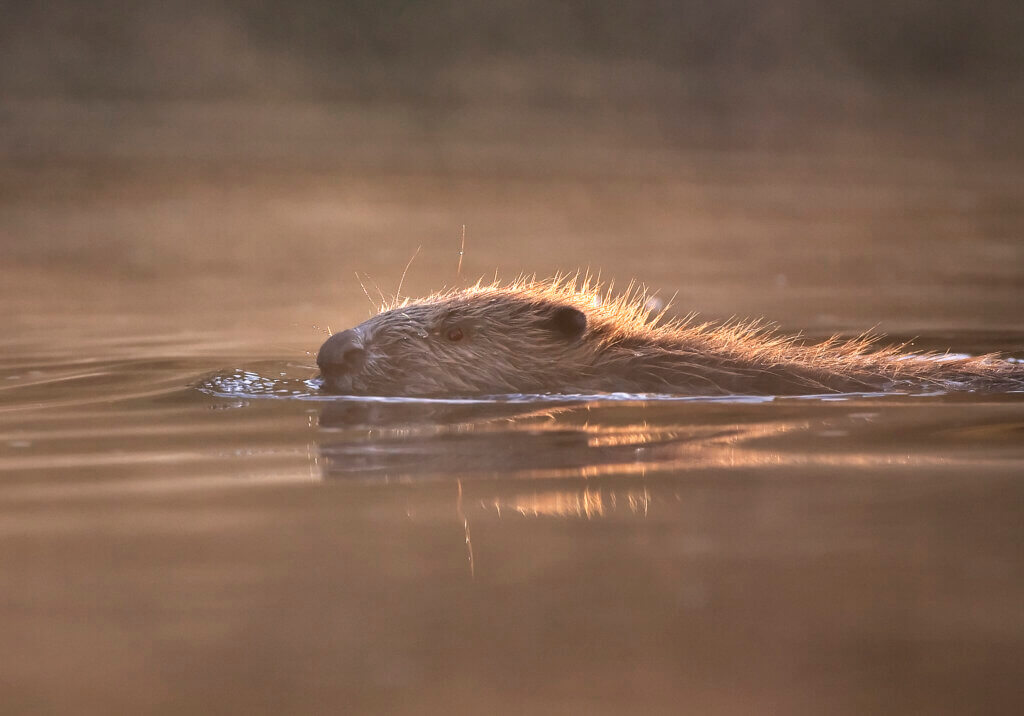
Scots want beavers moved not shot, new research finds
A majority of Scots agree beavers should be moved to new locations in Scotland instead of being killed, according to new research.
The findings come as Highland-based rewilding charity Trees for Life seeks to raise £40,000 through a crowdfunding appeal to help protect Scotland’s wild beavers. This will cover the costs of its current legal challenge over the failure of NatureScot – the Scottish Government’s nature agency – to make the killing of beavers a genuine last resort when the species needs managing.
The Protect Beavers In Scotland campaign has been boosted by a new opinion poll showing that 66% of Scots agree beavers should be relocated to new areas of Scotland instead of being killed when they need managing. Only 5% of those asked disagreed.
“With the future of Scotland’s endangered beavers hanging in the balance, it’s increasingly clear that NatureScot’s current illegal approach to beaver conservation is also out of step with public opinion,” said Steve Micklewright, Trees for Life’s Chief Executive.
“It shows people want to live alongside these biodiversity-boosting, flood-preventing animals – a finding boosted by the fantastic response to our current crowdfunding appeal to protect Scotland’s beavers.”
The opinion poll was carried out by market research agency Survation for the Scottish Rewilding Alliance, a coalition of organisations including Trees for Life. Over 1,000 people were asked whether they agreed or disagreed that NatureScot should relocate beavers before considering authorising their killing.
Beavers’ dams create nature-rich and flood-reducing wetlands. When beavers sometimes also have unwanted local impacts on agricultural land, laws governing protected species require any intervention to have the least possible impact on their conservation.
Lawyer Adam Eagle, Chief Executive Officer of The Lifescape Project, a legally specialist rewilding charity spearheading the litigation alongside Trees for Life, said: “There’s a strong legal case that NatureScot is breaking the law by failing to make killing of beavers a last resort, in failing to fully explore all other options, and in failing to ensure its actions do not compromise the survival of the species in Scotland.”
The Scottish Government declared beavers a legally protected species in May 2019, but in the following months NatureScot authorised the killing of 87 wild beavers.
Although NatureScot has identified over 100,000 hectares of suitable beaver habitat, the Scottish Government says beavers cannot be relocated to new areas within Scotland – significantly limiting the options for Tayside farmers whose crops are damaged by beavers.
A judicial review ruling in Trees for Life’s favour would ensure lethal control is a genuine last resort. Conservation charities and others will be able to identify – with proper community engagement – suitable sites around Scotland to which beavers could be moved and be safe and welcome.
Trees for Life says this would ensure a better future for beavers, which can be key allies in tackling the nature and climate emergencies. By helping prevent damage to farmers’ fields and ensuring farmers are less often forced to shoot much-loved and endangered animals, it would also be a farmer-friendly solution.
For more details on Trees for Life beaver appeal, see treesforlife.org.uk.
[registration_form]
Wild Justice could get onboard and take some long needed action in Scotland. NaturistScot have had it too easy for too long.
And I doubt very much that the people interviewed knew the full story re beaver and flood prevention, improved water quality, enhanced biodiversity and ecotourism opportunities. Yet still overwhelming support for translocating beavers. With only 12% of Scotland higher quality agricultural land beavers have a far, far higher potential of protecting that and our villages, towns, road and rail networks than damaging them, but again and again they are being framed as an agricultural pest by certain vested interests.
Less than an hour ago I found out that the 2007 Gloucestershire floods cost more than two billion pounds in damages. That manages to make the four hundred million plus I’ve been quoting for the 2005 Carlisle flood look like small change. If those close cropped Welsh hills that feed the Severn had some targeted tree planting (as of the Pontbren sheep farmers) and even beavers making some dams what difference would that have made? If this issue isn’t suited for open public discussion then I’m not sure what is.
Further evidence of the lack of influence that the citizen has over the ‘management’ of wildlife. How many more judicial reviews will be required before the regulators get it, I wonder?
If you could all write your MSPs and request they get moved to Ayrshire rivers, or Dumfriesshire rivers, that would sure be swell of you. Especially the River Irvine or River Ayr, which sorely need the kind of control and bio diversity that beavers can bring.
Although I admit they’d probably be safer from the farming and angling communities if they were released on the Clyde in Glasgow or around Hamilton. Less “Stewards of the countryside” trying to kill them.
Better still move the MSPs to these rivers plus the Nature Scotland management. They won“t be missed for all the use they are.
Very sadly pine marten, raven, red kite etc almost certainly far safer in the heavyish industry (what remains of it), intensive agriculture central belt than in ‘wild’ Scotland. That’s an unbelievably bloody awful situation. Quite a few otters suspiciously found dead by the side of the road up north. Down here live ones are all over the place, I’m practically surrounded by them. The best place in Scotland for a red kite translocation is almost certainly the one place where it’s never happened – as far away from the ‘sporting’ estates as possible in the Edinburgh to Glasgow corridor. There was a very positive piece from a fisherman about beavers and fish on the Scottish Wild Beavers FB page the other day, lo and behold the salmon boys tried to discredit it. Vested interest and outright idiocy dominate far too much of our rural politics.